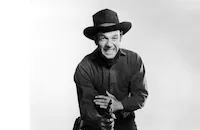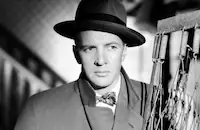Without Honor

Brief Synopsis
Cast & Crew
Irving Pichel
Laraine Day
Dane Clark
Franchot Tone
Agnes Moorehead
Bruce Bennett
Film Details
Technical Specs

Synopsis
One afternoon, in the San Fernando Valley, Dennis Williams drives to the house of his lover, Jane Bandle, who becomes concerned about his presence as her husband Fred is due home shortly. Although Dennis tells Jane that Fred has found out about their affair, probably through a private investigator, Jane is happy that their six-week relationship is now out in the open. However, Dennis, sure that others will make it all look sordid, worries about the effect the affair will have on his two teenage daughters, whom, he feels, must come first. He is anxious to maintain his scandal-free reputation and, therefore, tells Jane that their affair is over and that he is returning to his wife Katherine. Jane, who had wanted out of her loveless marriage, is totally disillusioned by Dennis' rejection and threatens to commit suicide with a shish kebab skewer. Dennis tries to stop her, but accidentally falls on the skewer, stumbles into the laundry room and collapses. Jane panics and realizes that she must somehow conceal Dennis' lifeless body, but procrastinates and is interrupted by two Girl Scouts collecting clothes for refugees in Europe. Then, her rough-edged brother-in-law Bill stops by looking for Fred and decides to wait for his return. Jane is distant with Bill when he talks about the old days and how she caused a rift between Fred and him: At a picnic, when an eighteen-year-old Bill gets drunk and tries to kiss Jane, and she tells Fred to "keep that filthy kid" away from her. In the present, Bill grabs Jane and kisses her. She slaps him and threatens to tell Fred, but Bill then reveals that Katherine Williams is coming over with her husband Dennis, to meet Fred. Jane learns that it was Bill who hired the detective and has set her up out of revenge. When Katherine arrives from Beverly Hills, she notices that Jane is trembling. After Bill prevents her from phoning the police, Jane slips out of the house and attempts to catch a bus, but Fred, who is driving home, spots her and picks her up. Back at the house Bill introduces Katherine to Fred, who assumes she is Bill's date. Bill then takes Fred outside to tell him about Jane's affair while Katherine tells Jane that, as the wronged wife, she is supposed to hate her, but does not, considering her merely a fool and a weakling. After Katherine informs her that Dennis had two other affairs, Fred returns and asks if she has anything to say. When she does not respond, he slaps her, then demands to know when Dennis is going to arrive. Jane breaks down and takes them to where she left his body, but it is gone. Jane becomes hysterical as Fred and Katherine follow a trail of blood and Bill phones for an ambulance. When questioned, the two Girl Scouts tell Fred and Katherine that they saw an ice cream truck stop and drive Dennis to a hospital in Van Nuys. Katherine phones the hospital and learns that Dennis is recovering, that he still loves her and that his lung injury has been designated as an accident. Jane goes into her bathroom and cuts her wrists, but the ambulance Bill summoned arrives and the two attendants treat her. Before Katherine accompanies Jane to the hospital, Bill tells the ambulance men to report the injury as an accident. While Fred packs items to take to Jane in the hospital, Bill tries to persuade him to abandon her, revealing the depth of his jealousy. Fred, however, accuses Bill of setting it all up, and claims that he has always been jealous of him and his life with Jane. When Fred goes to his car, Bill follows and declares that Jane is a double-crossing cheat, whereupon Fred punches him on the jaw and tells him to keep away from them. Fred then drives off while Bill runs hysterically after the car.

Director

Irving Pichel
Cast

Laraine Day

Dane Clark

Franchot Tone

Agnes Moorehead

Bruce Bennett
Frank Marlowe
Harry Lauter
Peter Virgo
Margie Stapp
Lester Dorr
Patricia Ann Ewing
Joan Dupuis
Harrison Hearne
Crew
Dewitt Bodeen
Murray Cutter
Perry Ferguson
Mary Gibsone
Harold Godsoe
Raymond Hakim
Robert Hakim
A. E. Houghton Jr.
B. P. Jaques
Lionel Lindon
William Lynch
John Miehle
James Poe
Robert Priestley
Lewis J. Rachmil
Harry Ray
Max Steiner
Josephine Sweeney
Gregg G. Tallas
Stanley Williams
Lothrop Worth

Film Details
Technical Specs

Articles
Without Honor -
After getting her start at RKO in several Westerns alongside actor George O'Brien, Laraine Day (billed in those early films as Laraine Johnson, a subtle variant of her birth name "La Raine") signed a contract with MGM and was cast in the first installment of the studio's popular Dr. Kildare series, Calling Dr. Kildare (1939), starring Lew Ayres. Day appeared in five more Dr. Kildare films, departing the series after its penultimate sequel Dr. Kildare's Wedding Day (1941). While Day never had the same level of stardom as some of her leading lady contemporaries at MGM, she was quite popular with audiences throughout World War II. But Day's greatest roles were outside of her studio contract, with films such as Alfred Hitchcock's Foreign Correspondent (1940) co-starring Joel McCrea, Mr. Lucky (1943) with Cary Grant and Bride by Mistake (1944) featuring a screenplay written by the legendary husband-and-wife duo of Henry and Phoebe Ephron.
Dane Clark was also a wartime staple at his home studio of Warner Brothers, making his credited debut alongside Humphrey Bogart in Action in the North Atlantic (1943), immediately followed by the immensely popular Destination Tokyo (1943), receiving third billing after veteran actors Cary Grant and John Garfield. Clark worked steadily throughout the 1940s and was given the chance to demonstrate his vast range as an actor in the rarely seen Moonrise (1948), directed by Frank Borzage. In the 1950s, Clark continued to make films, eventually making a successful transition to television and appearing in series such as The Twilight Zone, Ironside, Police Story, Fantasy Island and Murder, She Wrote, among many others.
Agnes Moorehead got her start in radio and was soon invited to join Orson Welles' Mercury Players, performing in several radio programs. In 1941, Welles cast Moorehead in Citizen Kane, which was her film debut and kicked off a long and successful Hollywood career, receiving four Best Supporting Actress Academy Award Nominations for performances in The Magnificent Ambersons (1942), Mrs. Parkington (1944), Johnny Belinda (1948) and Hush...Hush, Sweet Charlotte (1964). In 1964, Moorehead turned to television, starring as Endora in the popular sitcom Bewitched until 1972.
Director Irving Pichel got his start in 1930 under contract at Paramount Studios as a character actor. But it was behind the camera that interested Pichel, and in 1932 he made his co-directorial debut for RKO with The Most Dangerous Game, starring Joel McCrea and Fay Wray. Pichel spent most of the 1930s juggling his acting and directing career, but after signing a contract with 20th Century-Fox in 1939, Pichel shifted his focus entirely to directing, although he would occasionally provide uncredited voicework. Pichel enjoyed a prolific output throughout the 1940s with films such as The Pied Piper (1942), Tomorrow Is Forever (1946), Mr. Peabody and the Mermaid (1948) and the George Pal-produced Destination Moon (1950), which is perhaps his most recognizable film. Unfortunately, like so many others working in Hollywood at the time, Pichel's career suffered as he was targeted for his political affiliations by the House on Un-American Activities Committee.
Despite having the mature themes that post-war audiences craved, Without Honor was not at all well received. And critics weren't too terribly impressed either, offering sharp criticism over the decidedly adult and "trashy" subject matter as well as the wasted talents of the cast on such a lackluster story. The film also received swift condemnation from censors, affecting its release in a number of states and almost resulted in a complete ban in certain cities, such as Boston. The film was re-released in the 1950s as Woman Accused, not to be confused with the 1933 Paramount film The Woman Accused starring Nancy Carroll and Cary Grant.
A low-budget B film noir/melodrama, of which there were many excellent films with this designation produced in post-WWII Hollywood, Without Honor is an interesting film and curious entry in filmographies of its cast.
Director: Irving Pichel
Producers: Raymond Hakim and Robert Hakim
Screenplay: James Poe
Cinematography: Lionel Lindon
Editing: Gregg C. Tallas
Art Direction: Perry Ferguson
Original Music: Max Steiner
Cast: Laraine Day (Jane Bandle), Dane Clark (Bill Bandle), Franchot Tone (Dennis Williams), Agnes Moorehead (Katherine Williams), Bruce Bennett (Fred Bandle). BW-69m.
By Jill Blake

Without Honor -
Quotes
Trivia
Notes
This film's working titles were Twilight and Deep End. A January 1949 New York Times news item of early January 1949 reported that James Nasser would produce the picture with his partner Robert Hakim later that month subject to the casting of a leading man acceptable to Laraine Day. Only Hakim's brother Raymond is listed onscreen as co-producer, however. Advertisements for the film's San Francisco run indicated that "Dr. Fenna Simms, Ph.D., Famous Marital Relations Counsultant" would be in the theater's lobby "to talk with you!" The film encountered censorship problems in certain states and was almost banned in Boston. The picture was reissued in the 1950s as Woman Accused.














